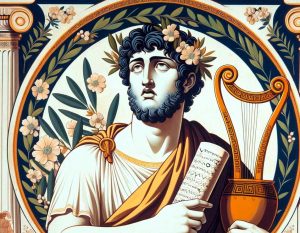Life and works of Pindar
Pindar (c. 518–c. 438 BC) was one of ancient Greece’s most renowned lyric poets, celebrated for his odes to victors of the ancient Greek Olympic Games and other athletic festivals. Born in Cynoscephalae, near Thebes, Pindar was a contemporary of Aeschylus, Sophocles, and Euripides, making him a critical figure in the cultural and literary landscape of Classical Greece. His work offers invaluable insights into Greek society, religion, and philosophy, as well as the personal honor and glory associated with athletic achievements.
Early Life and Education
 Though specifics about Pindar’s life are sparse and often derived from later sources, it is believed that he was born into an aristocratic family.
Though specifics about Pindar’s life are sparse and often derived from later sources, it is believed that he was born into an aristocratic family.
This background afforded him a comprehensive education, which likely included music, gymnastics, and possibly training in the composition and performance of lyric poetry.
Such an education would have been essential for someone who became renowned for his contributions to choral lyric poetry.
Work and Themes
Pindar’s poetry is primarily composed of epinicians, or victory odes, written to celebrate the achievements of victors in the four major Panhellenic Games: the Olympic, Pythian, Nemean, and Isthmian games. His odes are categorized accordingly into Olympians, Pythians, Nemeans, and Isthmians. These works are characterized by their complex metrical structures, use of mythological allusions, and moral and philosophical reflections.
Pindar’s poetry emphasizes the transient nature of human achievement and the favor of the gods, particularly Zeus, in granting success. His work reflects the values of arête (excellence) and time (honor), central to the Greek aristocratic worldview. He skillfully intertwines personal commendation with broader themes of human ambition, divine intervention, and the quest for eternal glory.
Style and Influence
Pindar’s style is noted for its complexity, including intricate metrical patterns and a dense use of mythology. His use of epinicia as a medium allowed for personal praise to be elevated into a discussion on morality, the gods, and the nature of human achievement. Despite the challenges in understanding his work, due to its linguistic richness and cultural references, Pindar’s odes have been admired for their lyrical beauty and philosophical depth.
Legacy
The survival of Pindar’s work into the present day, albeit partially, attests to his lasting influence on later generations. His poems were studied and imitated by later Greek and Roman poets, contributing to the tradition of epinician poetry. In the Renaissance, Pindar’s odes were rediscovered, leading to a renewed interest in his style and themes, which influenced European literature.
Pindar’s contribution to literature not only provides insights into the world of ancient Greek athletics but also offers reflections on the human condition that are timeless. His work remains a testament to the power of poetry to transcend the specific context of its creation and speak to universal aspects of human experience
